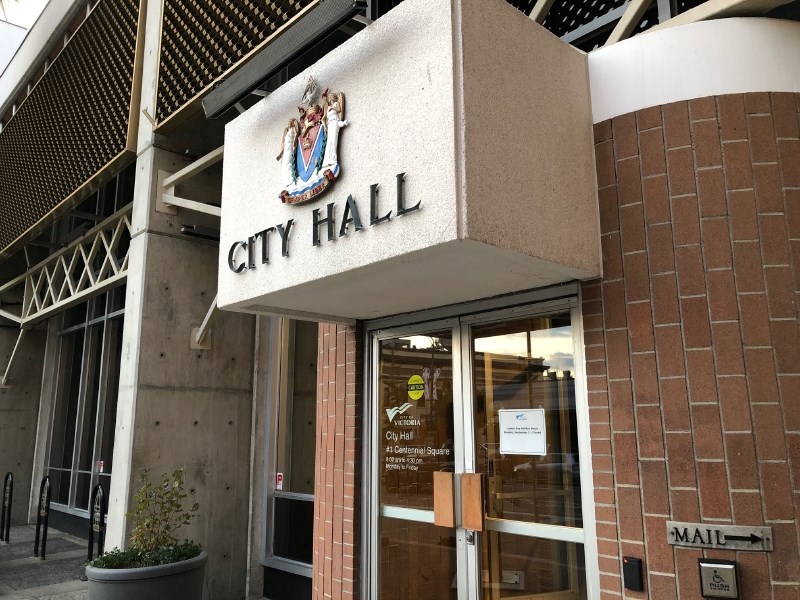Victoria councillors protected their free lunches Thursday even as they approved a suite of pandemic-relief measures and scrapped a 3.35 per cent property tax increase for 2020.
Councillors Charlayne Thornton-Joe and Marianne Alto, neither of whom partake in the catered lunches, tried unsuccessfully to scrap the perk, which costs the city about $10,000 a year.
They were voted down by the rest of council following a heated debate during which their motion was characterized as “embarrassing and petty.”
The issue surfaced toward the end of a lengthy discussion about the steps council could take to manage mounting revenue losses, while still assisting residents hard hit by the COVID-19 pandemic.
Staff revealed that the city faces potential revenue losses ranging from $6 million to $22 million, depending on how long the pandemic lasts.
Municipal governments are prohibited from running deficits, so council decided to defer more than $20 million worth of capital projects and reduce the amount of money it places in reserves in order to help residents and businesses.
The relief measures include:
• Reducing this year’s tax increase to zero.
• Allowing people to delay utility bill payments without penalty for up to 90 days instead of 45.
• Pushing back the property-tax due date for both residential and commercial properties to Aug. 4 from July 2.
• Staggering the penalties for late payment of property taxes over five months instead of two to reduce the burden on people unable to pay on time.
In addition, council moved to lower parking rates downtown to provide relief to those who are still employed and need to drive to work. As of Friday, the maximum daily rate at a parkade will be $5 or the equivalent of a daily bus pass. On-street parking will be $1 per hour with no time limits, except for 30-minute spots.
The rates will remain in place as long as the provincial state of emergency continues.
Mayor Lisa Helps said more than $80 million worth of capital projects are still moving forward and will support the local economy, while the deferred projects will assist with the recovery down the road.
Helps pushed to cut the property tax increase to zero, arguing at committee of the whole that it was one of the few ways council could help struggling residents and businesses.
The average homeowner will save $85 as result, while a typical business will save $237.
“I do think we need to send some signals to all the people in the community that we’re doing everything that we can to support everybody through this very difficult time,” she said.
Her motion was supported by councillors Sharmarke Dubow, Geoff Young, Alto and Thornton-Joe.
Dubow said it was important for the city to continue playing a leadership role.
“We must work with all levels of government so that the health and economic prosperity of Victoria is preserved,” he said.
Councillors Ben Isitt, Jeremy Loveday and Sarah Potts opposed cutting the tax increase to zero, although they were prepared to consider reducing it to the rate of inflation.
Isitt said it’s unclear whether such modest tax relief measures would help the local economy recover more than having the city use the money to create jobs.
“I think all levels of government are going to need to step up their economic stimulus and their direct investment in job creation, and this is reducing our capacity to do so,” he said.
Loveday called it “irresponsible” to cut the tax increase to zero.
“We have rising expenditures this year and in future years, and I think this is putting both the City of Victoria and taxpayers in the future into a place of having to pay more,” he said.
“We don’t know what the economy is going to do. It may be worse next year than it is now.”
Council agreed to revisit the 2020 budget in July to see whether further adjustments will be needed.
Thornton-Joe raised the “free lunch” issue toward the end of the debate.
“If there’s any time that it sends a clear message that council is concerned, I think this is the time that we should, at least for the time being, consider the removal of our lunches as part of the budget,” she said.
Isitt countered that Thornton-Joe was in a different financial position than some councillors.
“The mover said she can afford it,” he said.
“Great for her. I know colleagues of mine who have trouble making ends meet, and maybe they can’t afford it. Maybe it’s a small perk for a very difficult job.”
Helps added that the catered lunches represent a form of economic stimulus since they’re purchased from local businesses.
“So any time we are ordering lunch from a local restaurant that’s still open, we’re keeping people in their jobs,” she said. “We’re helping to keep our small restaurants afloat.”
Loveday, meanwhile, took exception to Thornton-Joe raising the issue at all.
“This feels embarrassing and petty,” he said. “I can’t believe we’re debating this for the third time this year. If we want our meetings to be shorter, let’s stop debating the same thing over and over again. Let’s get on with it. We have a real economic crisis here and that’s what we need to be discussing.”
In the end, only Thornton-Joe and Alto voted in favour of cancelling the lunches.



